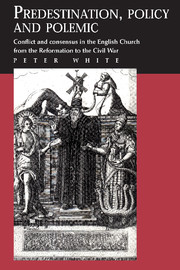 Predestination, Policy and Polemic
Predestination, Policy and Polemic Book contents
- Frontmatter
- Contents
- Preface
- Acknowledgements
- 1 The polemics of predestination: William Prynne and Peter Heylyn
- 2 The theology of predestination: Beza and Arminius
- 3 Early English Protestantism
- 4 The Elizabethan church settlement
- 5 Elizabeth's church: the limits of consensus
- 6 The Cambridge controversies of the 1590s
- 7 Richard Hooker
- 8 The early Jacobean church
- 9 The Synod of Dort
- 10 Policy and polemic, 1619–1623
- 11 A gag for the Gospel? Richard Montagu and Protestant orthodoxy
- 12 Arminianism and the court, 1625–1629
- 13 Thomas Jackson
- 14 Neile and Laud on predestination
- 15 The personal rule, 1629–1640
- Select bibliography
- Index
4 - The Elizabethan church settlement
Published online by Cambridge University Press: 11 September 2009
- Frontmatter
- Contents
- Preface
- Acknowledgements
- 1 The polemics of predestination: William Prynne and Peter Heylyn
- 2 The theology of predestination: Beza and Arminius
- 3 Early English Protestantism
- 4 The Elizabethan church settlement
- 5 Elizabeth's church: the limits of consensus
- 6 The Cambridge controversies of the 1590s
- 7 Richard Hooker
- 8 The early Jacobean church
- 9 The Synod of Dort
- 10 Policy and polemic, 1619–1623
- 11 A gag for the Gospel? Richard Montagu and Protestant orthodoxy
- 12 Arminianism and the court, 1625–1629
- 13 Thomas Jackson
- 14 Neile and Laud on predestination
- 15 The personal rule, 1629–1640
- Select bibliography
- Index
Summary
Returning exiles and doctrinal definition
A sharp discontinuity between the old English Protestantism of Edward's reign and the theology of the Elizabethan church underlay Heylyn's understanding of the English Reformation. His assumption that the return of the Marian exiles marked the triumph of Calvinism has been widely accepted. A typical judgment is that the exiles consisted mainly of those who ‘set least store on the bonds that tied them to historic catholicity … In more or less degree they came under the spell of Calvin's genius.’ Other historians, it is true, have recognised that in liturgical matters many of the exiles ‘were openly opposed to Calvin and his influence’, that they were in no sense a single party, and that those who went to Zurich and Strasburg were independent of, if not actually opposed to, Geneva; but they have nevertheless conceded that in doctrinal matters ‘the Anglican Church, from the time of Archbishop Parker to the end of the century, was Calvinistic. The Lambeth Articles cannot otherwise be interpreted.’ Those conclusions were in harmony with studies of the political role of the exiles which suggested that they constituted a radical opposition group both in and out of Parliament, the nucleus of a Puritan party. As a result of their activities, it appeared, the queen was forced to accept a much more radically Protestant church than she had wanted or intended.
Recent scholarship demands a major revision of this picture. Politically, it is clear, returning exiles played an insignificant role in the Parliament of 1559. At most, there were nineteen members who had been in exile, of whom eleven had resided mainly in Italy as political and not religious exiles.
- Type
- Chapter
- Information
- Predestination, Policy and PolemicConflict and Consensus in the English Church from the Reformation to the Civil War, pp. 60 - 81Publisher: Cambridge University PressPrint publication year: 1992
